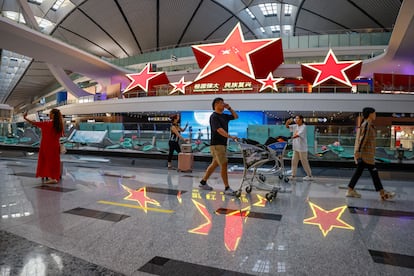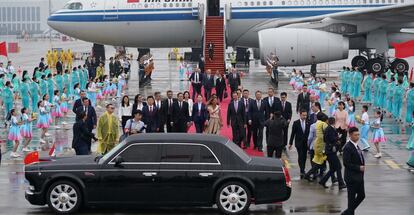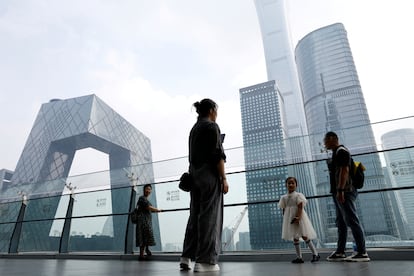China: The complex task of reconnecting to the world after the pandemic
Beijing insists on its openness, while the disengagement persists in several sectors months after reopening its borders


A couple of weeks ago, Li Shulei, a member of the powerful Chinese Politburo, took the stage in a plush hall in Beijing and talked to the audience about the need to promote “exchanges between civilizations,” and the importance of strengthening “knowledge” and “understanding” between China and the rest of the world. In short, he was advocating “opening up” his country.
It was the inaugural speech for the newly created Orchid Awards, with which the People’s Republic seeks to recognize the contribution of foreign citizens to this mutual store of knowledge. But something else was in the air. As Spanish sinologist Alicia Relinque, one of the prize-winners, saw it, the event seemed to sum up a message from Beijing: “We are coming back.”
After three years isolated from the rest of humanity due to the pandemic, China is finding it hard to reconnect: people-to-people exchanges are still far fewer than before Covid; flights are still below 2019 levels; investors are looking at other markets; Western companies based in China are having trouble attracting staff, especially if they have families; and educational and cultural institutions are finding it hard to find English, Spanish and French teachers.
“It’s as if the country is suffering from long Covid,” a senior European manager based in China says, preferring to remain anonymous. The economy is not cranking up as expected. And the EU Chamber of Commerce in China, which represents more than 1,700 businesses, believes the Chinese government is sending mixed signals.
“They are trying,” says Relinque, a professor of classical Chinese literature at the University of Granada and an expert in a country she first traveled to as a student in 1985 and has visited nearly every year since. Prior to Covid-19, there used to be “a lot of foreigners” in the big cities, she recalls. The younger foreigners have stuck it out, but the older ones have left. That exchange — also of Chinese traveling abroad — injected a lot of life into the country, she adds. “And I think they want to get that back.”
Returning to China after a three-year hiatus due to the pandemic, the sinologist found a country exercising “far greater control” with omnipresent technology: as soon as you land “suddenly everything depends on the cell phone,” she says. In her opinion, the country still has to “adapt” and recover “bit by bit.” But she does see efforts being made by Beijing as she has already received several invitations to attend different events.
Official messages about opening up have multiplied, and no week goes by without international conferences in a range of sectors. Before the summer, Chinese digital payment platforms, such as WeChat and Alipay, announced that they would allow foreigners to pay with foreign cards, to ease the tourist experience. And, on September 20, Beijing announced that it would reduce the information required when applying for a visa. “This will significantly shorten the time needed to fill out forms and facilitate the application process,” said foreign spokeswoman Mao Ning, who also spoke of facilitating “people-to-people exchanges” and “high-level openness.”
The tourism data from the summer lagged far behind pre-Covid figures. Shanghai, the country’s financial epicenter and a major tourist destination, welcomed just 756,000 foreign visitors in the first half of the year, 22% of the 2019 figure.
“Expect a lot of visits in the fall,” says Beijing-based U.S. economist Michael Pettis, referring to business and political delegations who have not set foot in China for more than three years.
The visits have been gathering momentum since the reopening. In March and April, Beijing received European leaders such as Spanish Premier Pedro Sánchez, European Commission President Ursula von der Leyen, and French President Emmanuel Macron. Hot on their heels came high-ranking officials from Washington trying to mend soured relations, namely Secretary of State Antony Blinken in June and Secretary of Commerce Gina Raimondo last month.
Now everyone from mayors to ministers are jumping on the bandwagon. On September 20, Rosana Morillo, Spanish Secretary of State for Tourism, embarked on her Chinese agenda — air connections with Spain have almost recovered their pre-pandemic rate. Visits are piling up and overlapping too with those of heads of state, such as Venezuela’s President Nicolás Maduro on September 12 and Syria’s President Bashar al-Assad on September 21.

At the same time, a parade of European commissioners has begun to file into the country: three have visited Beijing this week alone, among them the EU’s executive vice-president in charge of the economy, Valdis Dombrovskis. The Latvian arrived in the People’s Republic on Friday with the difficult task of explaining the de-risking strategy advocated by Brussels. His trip comes after an announcement of an investigation into China’s alleged state subsidies for its electric vehicles, which has not gone down well with Beijing.
Trade relations are the most obvious challenge when it comes to reconnecting to a world shaken by the war in Ukraine and other global storms. “In the current geopolitical situation, the greatest risk we run with China is the absence of dialogue,” say EU sources familiar with Dombrovskis’ visit. His trip is also an opportunity to meet China’s new leaders appointed in recent months, and to reopen high-level channels of dialogue, engage in a frank exchange and listen “on the ground” to European businessmen. One of Brussels’ main concerns is the “deterioration” of the business climate, these sources add.
That environment continues to be affected by the “past three turbulent years” in which “predictability and reliability” have been eroded due to Beijing’s “erratic policy changes,” according to a report released on September 20 by the EU Chamber of Commerce in China. Companies are facing a “growing sense of uncertainty” caused by the government’s contradictory messages, coupled with a stalling economy.
In July, President Xi Jinping called for steps towards a “higher level of openness” and efforts to boost foreign investment and trade cooperation; this was followed by a 24-point guide drawn up in August by the State Council to improve the climate for foreign investment. At the same time, however, the People’s Republic is flying the flag of self-reliance and national security at every opportunity. In recent months, it has passed an anti-espionage regulatory reform and a new foreign relations law that have been a wake-up call for foreign businessmen.

Foreign companies don’t know whether to trust the signals that the country is opening up. “There is some fatigue regarding the promises,” Jens Eskelund, president of the EU Chamber, said on September 20 at the launch of its report. “We hear promising words [from the Chinese government], but what’s really happening on the ground?”
According to the report, there are signs of a disconnect. Some 12% of European companies have already moved parts of their supply chain out of China and 75% have outlined some kind of risk reduction strategy, according to internal surveys. In the second quarter of this year, one of the indicators of direct foreign investment in China plummeted to 1989 levels, according to official figures reported by Bloomberg. Esklund sees this as the fallout from the travel ban to China during Covid.
Meanwhile, international travelers amounted to 33.7% of their 2019 levels in the second quarter of this year, the report points out, though Eskelund hopes to see numbers rise. “Maybe we will start to see an uptick in the number of Europeans returning to China to work, bringing their families with them,” he says. The document contains more than 1,000 recommendations for improving business conditions in China, the most significant being the depoliticization of the business climate.
With rivalry with the U.S. at an all-time high, it escaped no one’s notice at the Orchid Awards that the top award went to an American, Joseph W. Polisi, music educator and president emeritus of the Chinese branch of The Juilliard School, a prestigious performing arts conservatory. In his speech, Polisi expressed his appreciation for “the vision of creating an award that will ensure that cultural communication between people becomes much more intense again so that we can all begin to understand each other better.”
Sign up for our weekly newsletter to get more English-language news coverage from EL PAÍS USA Edition
Tu suscripción se está usando en otro dispositivo
¿Quieres añadir otro usuario a tu suscripción?
Si continúas leyendo en este dispositivo, no se podrá leer en el otro.
FlechaTu suscripción se está usando en otro dispositivo y solo puedes acceder a EL PAÍS desde un dispositivo a la vez.
Si quieres compartir tu cuenta, cambia tu suscripción a la modalidad Premium, así podrás añadir otro usuario. Cada uno accederá con su propia cuenta de email, lo que os permitirá personalizar vuestra experiencia en EL PAÍS.
¿Tienes una suscripción de empresa? Accede aquí para contratar más cuentas.
En el caso de no saber quién está usando tu cuenta, te recomendamos cambiar tu contraseña aquí.
Si decides continuar compartiendo tu cuenta, este mensaje se mostrará en tu dispositivo y en el de la otra persona que está usando tu cuenta de forma indefinida, afectando a tu experiencia de lectura. Puedes consultar aquí los términos y condiciones de la suscripción digital.








































